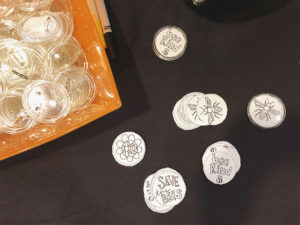A local beekeeper came to Houghton on September 10th, as part of a CAB event put on by Abigail Taylor. “During the semester, each CAB member plans and puts on a small event for campus, called a Pop Up,” explained Taylor. “We don’t advertise until the day of the event. When I was in the planning stages for my pop up theme, I came across the random fact that September is National Honey Month. I love honey, I love bees, and I am passionate about the ‘save the bees’ movement, so I thought this would be a cool idea.”
 Taylor’s theme found a warm reception from students visiting the table. “I loved the event!” said senior Tyger Doell. “I was really happy to see that she was promoting something that’s really important. A lot of people don’t think of bees that often, so I’m really glad that they linked it to the important aspect of bees, instead of just talking about honey.”
Taylor’s theme found a warm reception from students visiting the table. “I loved the event!” said senior Tyger Doell. “I was really happy to see that she was promoting something that’s really important. A lot of people don’t think of bees that often, so I’m really glad that they linked it to the important aspect of bees, instead of just talking about honey.”
Helen Draper, another senior who stopped by the event, agreed with the need for more education surrounding bees. “They’re often overlooked,” she pointed out. “When people think of bees, they think of bee allergies or bee phobias. Even if you have those issues with bees, that doesn’t mean you shouldn’t be concerned about their prevalence, because they play a key role ecologically.” Statistics agree with Draper: a study from Cornell University, reported in The Ecologist and the USDA’s AgResearch magazine, found that honey bees contribute 14 billion dollars to agriculture in the US alone. While most of that money comes from boosts to crop harvesting through pollination, all of that work on the part of the bees results in a lot of honey.
While commercially farmed honey is available to students in the dining hall, Taylor wanted to offer something special at the event. “I invited a local honey producer from Fillmore, Wagoner’s Bees and Produce, because I wanted to have local honey available to buy,” she said. “Deb, from Wagoner’s, also had a lot of educational material on bees and why they are so important to our earth, so that was really interesting.”
The approachable beekeeper also educated students on some of the surprising uses of honey, including its antimicrobial and wound-healing properties. As surprising as Wagoner’s account of curing her husband’s staph infection with honey might sound, it’s not implausible. A study from the National Center for Biotechnology Information (NCBI) confirms the antioxidant, antibacterial and anti-inflammatory properties of honey, as well as its merits for pain relief. “It’s a good staple to have in your cupboard, because it’s useful for so many things,” affirmed Draper.
Alongside the hard facts, Taylor kept a lighthearted spin on the event. “I designed four different button pin inserts that people could color and then wear,” she said, “and we had free honey stix for everyone that stopped by.” Doell appreciated the takeaway nature of the pins as a memento to keep the enthusiasm for honey and for bees fresh when September passes.
Overall, Taylor was pleased with the turnout. “It was a pretty easy event, very low key, but we got a lot of good feedback and people enjoyed learning more about bees!” she said. “And a lot of people walked away with yummy local honey, so that’s definitely a plus. It was a unique thing to do on campus, and I got to buy balloons shaped like bees.”
